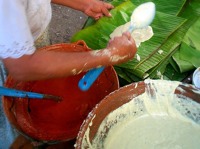"[A] majority of illegal immigrants live in the same communities as legal permanent residents – and in many cases the same houses – they often act in solidarity when either group feels threatened."
from Legal immigrants seek American citizenship in surging numbers
Christian Science Monitor, March 26, 2007
Tuesday, March 27, 2007
Monday, March 26, 2007
Tamale treasure
 Mack at Coyote Chronicles visited a Middle Tennessee tamale kitchen and found treasure in the time spent with his neighbors:
Mack at Coyote Chronicles visited a Middle Tennessee tamale kitchen and found treasure in the time spent with his neighbors:Through the goodness of the Gods, I met an angel in the grocery store. Her and her mother were buying groceries, and from their selections I just knew momma was a first rate cook. I engaged them, and soon we agreed on a price for home-made tamales. (my current tamale connect is reliable, but the product has been sub-standard of late) So, yesterday, I arrived at their home with a good friend of mine in tow. The area of town that they live in isn’t particularly nice. It is mere steps from the railroad tracks, and this road is chock full of renters so many of the houses and yards are in a constant state of dis-repair. We knocked on the door, and Maria opened it, smiled broadly and invited us into the kitchen, where her mother and Aunt were just removing tamales from a large pot on the stove. There was food everywhere. The sights and smells were at once familiar and comforting. I was in my mother’s house again. There were four children present, sitting in chairs by the open back door, and speaking a beautiful mixture of Spanish and English, drawing or coloring and laughing most of the time. Their girls had their jet black hair brushed and braided and they had shiny things holding it in place. Their faces were scrubbed clean, their clothes pressed. The house was orderly and chaotic at the same time. The women smiled at us and made us sit at the table, and sample the tamales. Alicia took hers, freshly “shucked”, and sprinkled it with chopped lettuce, then ladled some fresh salsa over it and handed it to my friend. She warned that it was “hot.” I though she meant “stove hot,” but no, as my friend soon discovered, she meant hot in the way that hot can hit your stomach, then work it’s way back up through your lungs and ultimately engulfs you in a perfect capsicum laden cloud, causing your metabolism to accelerate, sets your heart to racing, and ends with you wiping your brow on your shirtsleeve. That kind of hot. Perfect. As I was enjoying this dish, I was struck by those faces over by the door. Each of them had the most beautiful eyes I have ever seen. Large, oval and it may sound corny, but I saw the whole world in them. The oldest was born in Mexico, but came here when she was one yr old. Her brother and sisters were born here in the States. I was glad that my friend Andy was there, but I so wanted Kleinheider to be there as well. I wanted him to see this family. I wanted him to taste this food, I wanted him to gaze at these children, and then, I wanted him to explain to me what would be gained by him “walking them back over the border.” The preservation of the rule of law? Unjust laws are, and have been challenged throughout this Nation’s history. It’s intrinsic to the American experience. Welcoming and celebrating the presence of these people seems intrinsic to the Christian experience. I so want to challenge Adam to accompany me to this home, talk to this family, share a meal, and learn about what its like to live in the shadows...Full story here
Photo by Steve Bridger
Who's an american?
Letter to the Editor
University of Chicago Magazine
March/April 2007, Volume 99, Issue 4
Who’s an american?
My family came to America at Jamestown, Virginia, in 1609 and at Plimoth Plantation, Massachusetts, in 1620. As old immigrants (“Fenced Out,” Jan–Feb/07), we offer the following credo to the new immigrants from then, to the present, and into the future:
No matter where people come from, if they behave themselves, work hard, and respect our history and culture, they are Americans. And if we behave ourselves, work hard, and respect their history and culture, we are Americans too.
James A. Rogerson, AM’69, PhD’80
Charlotte, North Carolina
University of Chicago Magazine
March/April 2007, Volume 99, Issue 4
Who’s an american?
My family came to America at Jamestown, Virginia, in 1609 and at Plimoth Plantation, Massachusetts, in 1620. As old immigrants (“Fenced Out,” Jan–Feb/07), we offer the following credo to the new immigrants from then, to the present, and into the future:
No matter where people come from, if they behave themselves, work hard, and respect our history and culture, they are Americans. And if we behave ourselves, work hard, and respect their history and culture, we are Americans too.
James A. Rogerson, AM’69, PhD’80
Charlotte, North Carolina
Subscribe to:
Comments (Atom)
